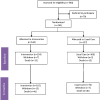Web-based collaborative care intervention to manage cancer-related symptoms in the palliative care setting
- PMID: 26970434
- PMCID: PMC4828258
- DOI: 10.1002/cncr.29906
Web-based collaborative care intervention to manage cancer-related symptoms in the palliative care setting
Abstract
Background: The aim of this study was to examine the efficacy of a collaborative care intervention in reducing depression, pain, and fatigue and improve quality of life.
Methods: A total of 261 patients with advanced cancer and 179 family caregivers were randomized to a web-based collaborative care intervention or enhanced usual care. The intervention included the following: 1) a web site with written and audiovisual self-management strategies, a bulletin board, and other resources; 2) visits with a care coordinator during a physician's appointment every 2 months; and 3) telephone follow-up every 2 weeks. Primary patient outcomes included measures of depression, pain, fatigue, and health-related quality of life. Secondary outcomes included Interleukin (IL)-1α, IL-1β, IL-6, and IL-8 levels, Natural Killer (NK) cell numbers, and caregiver stress and depression.
Results: At the baseline, 51% of the patients reported 1 or more symptoms in the clinical range. For patients who presented with clinical levels of symptoms and were randomized to the intervention, reductions in depression (Cohen's d = 0.71), pain (Cohen's d = 0.62), and fatigue (Cohen's d = 0.26) and improvements in quality of life (Cohen's d = 0.99) were observed when compared to those in the enhanced usual car arm at 6 months. Reductions in IL-6 (φ = 0.18), IL-1β (φ = 0.35), IL-1α (φ = 0.19), and IL-8 (φ = 0.15) and increases in NK cell numbers (φ = 0.23) were observed in comparison with enhanced usual care arm at 6 months. Reductions in caregiver stress (Cohen's d = 0.75) and depression (Cohen's d = 0.37) were observed at 6 months for caregivers whose loved ones were randomized to the intervention arm.
Conclusions: The integration of screening and symptom management into cancer care is recommended.
Keywords: biobehavioral psychology oncology; collaborative care; depression; pain; quality of life.
© 2016 American Cancer Society.
Conflict of interest statement
Figures





References
-
- NIH State-of-the-Science Statement on symptom management in cancer: pain, depression, and fatigue. NIH Consens State Sci Statements. 2002;19:1–29. - PubMed
-
- Atesci FC, Baltalarli B, Oguzhanoglu NK, Karadag F, Ozdel O, Karagoz N. Psychiatric morbidity among cancer patients and awareness of illness. Support Care Cancer. 2004;12:161–7. - PubMed
-
- Hofman M, Ryan JL, Figueroa-Moseley CD, Jean-Pierre P, Morrow GR. Cancer-related fatigue: the scale of the problem. Oncologist. 2007;12(Suppl 1):4–10. - PubMed
-
- Lynch BM, Steginga SK, Hawkes AL, Pakenham KI, Dunn J. Describing and predicting psychological distress after colorectal cancer. Cancer. 2008;112:1363–70. - PubMed
Publication types
MeSH terms
Grants and funding
LinkOut - more resources
Full Text Sources
Other Literature Sources
Medical

